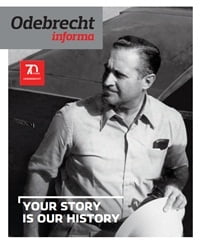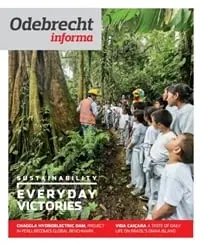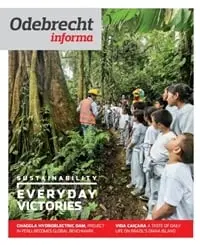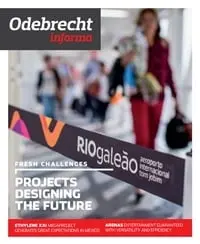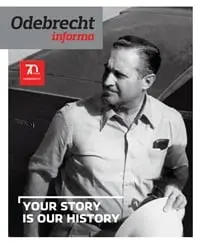written by Livia Montenegro
photo by Fernando Vivas e Márcio Lima
Founded in 1965 as Emílio Odebrecht Foundation (Fundação Emílio Odebrecht), the Odebrecht Foundation’s initial challenge was to assist the members of the builder and their families on welfare, health and social affairs. This focus of activity lasted until the early 1980s, when the institution refocused its efforts on issues of public interest, contributing to solving social problems. In 1988, it became dedicated to youth and defined the mission of “Educating for life, through work, for values and boundaries.”

In 1999 it began operating in rural areas of the Northeast of Brazil. In all, 18 municipalities of Bahia, Pernambuco and Ceará were chosen for the implementation of Alliance with Teenagers for the Sustainable Development (Aliança com o Adolescente pelo Desenvolvimento Sustentável) project, conducted in partnership with the Ayrton Senna Institute (Instituto Ayrton Senna), the Kellogg Foundation (Fundação Kellogg) and the National Bank for Social and Economical Development (Banco Nacional de Desenvolvimento Econômico e Social – BNDES). One of the regions covered was Southern Bahia, where, since 2003, the Odebrecht Foundation focused all its actions and became one of the developers of the Program for the Development and Growth Integrated with Sustainability of the Mosaic of Environmental Protection Areas of Southern Bahia (Programa de Desenvolvimento e Crescimento Integrado com Sustentabilidade do Mosaico de áreas de Proteção Ambiental do Baixo Sul da Bahia – PDCIS), which also has the support of public and private partners.
“The challenge is to make rural areas that have important environmental assets prosperous. The focus is youth and their families, representing the productive power and the development of where they live,” says Delcy Machado, Vice-President of Sustainability at the Odebrecht Foundation. The phrase summarizes the guidelines of an institution that, in nearly five decades of existence, keeps its central thread: family.
Through PDCIS, the Odebrecht Foundation helps transform the reality of living in Southern Bahia, encouraging the generation of employment and income, education, building a more egalitarian society, and conserving natural resources. Thanks to Participatory Governance, it bears the spirit of service, uniting efforts of Governments (Federal, State and Municipal), companies and civil society.

Zilma Jesus da Conceição, 41, is one of the beneficiaries. According to the farmer, it is possible to note changes in the community where she was born. “I became part of cooperative and have a fair monthly income, which made it possible for my family to be the owner of its own business,” says the resident of the Riachão community, in the municipality of Ituberá (BA).
Zilma became associated with the Cooperative of Rural Producers of the Environmental Protected Area of Pratigi (Cooperativa das Produtoras e Produtores Rurais da área de Proteção Ambiental do Pratigi – Cooprap) in 2005. Her daughter, Valdice Jesus, 17, is attending the third year in the Agroforestry Family House (Casa Familiar Agroflorestal – Cfaf). “I share all the knowledge I acquire at the Family House with my parents. I know a bit of the theory, and they know in practice.”
Antonio Nascimento Santos, 65, also found a growth opportunity in the Cooperative of Palm Heart Producers of Southern Bahia (Cooperativa dos Produtores de Palmito do Baixo Sul da Bahia – Coopalm). “It was through the cooperative that I was able to cultivate palm heart. Now we have our technical support and increased productivity,” says the resident of the Margarida Alves settlement, also in Ituberá.
Antonio shares his name and work with his son, aged 24, the only one of three brothers who remained in the field. With a degree from the Rural Family House of Igrapiúna (Casa Familiar Rural de Igrapiúna – CFR-I), he believes that now it is possible to prosper without the need of migrating to large cities. His father bets on the same path and shows happiness to have him by his side, working on the land.
Protagonists
The families of Zilma and Antonio represent hundreds of other people benefited by the PDCIS. Cfaf, Cooprap, CFR-I and Coopalm are some of the 17 institutions that are part of it. In 2013, over 23 thousand people were directly benefited, 424 young rural entrepreneurs were trained and over 1,100 families were associated to the cooperatives.
According to Mauricio Medeiros, CEO of the Odebrecht Foundation, the set of actions in Southern Bahia has created conditions for these families to become protagonists of their own destinies. “They have access to knowledge and field-oriented technology. They qualify as rural entrepreneurs, building the ideal convergence between labor and capital towards sustainable growth.”


